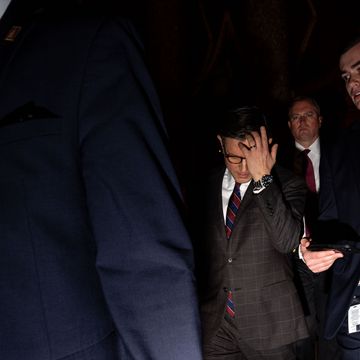There is truly rancid journalism news today, so let's get past it fast. The atrocity murder of James Foley by the militarized Dahmers of ISIS prompted one Charles C. Johnson, a walking pustule we last saw involving himself in the hilarity surrounding the Mississippi Republican senatorial primary, to unlimber his inner bacterium on the Twitter machine. Scott at LGM puts paidto this inhuman blatherskite beyond my poor ability to add anything. But it certainly is a fine new age of citizen-journalism into which we've entered.
That being said, there seems to be a growing backlash rising among the more delicate flowers of the craft against the people who are on the ground in Ferguson, Missouri. To the surprise of approximately nobody, the race to the fainting couch is being led by the kidz at Tiger Beat On The Potomac, and specifically by "media" reporter Dylan Byers, who continues to be to journalism criticism what a hacksaw is to thoracic surgery. (And let us leave aside for the moment the simple fact that any publication that continues to employ Mike "Payola" Allen in a position of authority, while he's out there being a big old corporate 'ho to find sponsors for his next interview with the vampires, has lost its credibility to criticize anyone else's journalism, up to and including North Korean state media.) First, Byers decided the nation needed to know that Ryan Reilly and Wesley Lowery, the two journos rousted in a McDonald's for the crime of charging their electronic devices too slowly, were great guys, but that they were not "heroes."
Then there was the outpouring of praise for the two reporters. On Wednesday night, Lowery and Reilly's colleagues treated them as if they'd just published a Pullitzer Prize-worthy investigation of police brutality. Reid Wilson, a Post politics reporter and the former editor-in-chief of The Hotline, described Lowery as "the kind of reporter I look up to." Dan Balz, who has spent nearly 40 years covering politics for the Post, praised his "maturity and courage." Over at the Department of Justice, spokesman Brian Fallon tweeted that the DOJ was "lucky to have a gutsy reporter like Ryan Reilly on our beat." (Seizing on the irony, CNN's Jake Tapper replied to Fallon, "How do you distinguish between the 'gutsy' reporters and the one the administration is threatening to put in jail?") Lowery and Reilly deserve recognition for their reporting efforts, but getting arrested at a McDonald's does not a great reporter make. Video of the arrest shows that Lowery didn't exactly move with great haste when the officer told him to vacate (though that doesn't make the officer's actions forgivable). MSNBC's Joe Scarborough criticized Lowery for that on Thursday morning, and Lowery responded by telling CNN that Scarborough should "come down to Ferguson and get out of 30 Rock where he's sitting, sipping his Starbucks smugly." Many sided with Lowery, a few may have sided with Scarborough. One hopes that the majority chafed at how a story about race and police brutality turned, for a moment too long, into a pissing match between two members of the media.
OK, long block quote, but well worth it. If it is possible for someone to be more obviously a head of dick, I'd buy a ticket to watch it happen. Neither Reilly nor Lowery ever claimed to be a "hero." (I have to admit that Tapper's question of the DOJ guy was terrific, but it has nothing to do with Byers's central point, whatever it is.) Getting busted by Rambo idiots in uniform may not make one a "great reporter" by the lofty standards of Dylan Byers, but it gets you closer to being one than sitting on your arse and sticking up for Joe Scarborough, with whom Byers may well be pricing silver patterns any day now. And I'd like to remind Byers that the "pissing match" only started when Morning Squint jumped in with both clown shoes.
Then, yesterday, we had Byers -- and his colleague Hadas Gold -- embarking on what I am sure appears to them to be actual journalism, in which they talked to people and quoted what they said. Two of these people are useless, wingnut-welfare hacks from Hot Air and The Daily Caller. But they did find at least one useful shrinking violet in academia, a woman named Amy Simons, who is an assistant professor at University Of Missouri's School of Journalism. According to the school's website, this is Simons's job:
Amy Simons teaches multi-platform reporting and editing to students in the convergence journalism interest area.
If she does really well, Simons one day may be promoted to a job that can be described in actual English. Anyway, reached on one of her many platforms, Simons was very concerned that CNN's Don Lemon, who got rousted himself by the Rambo idiots in uniform, might have unacceptably violated the boundaries of the convergence journalism interest area by offering his assistance to the Brown family in their time of grief.
"To me that was a line that was very clearly crossed," said Amy Simons, an assistant professor at the University of Missouri School of Journalism. "He had gone from being an independent journalist to clearly advocating and making it known which side of this issues he's on at the moment."
Oh, just bite me. What Lemon did was bring his own experience -- what had happened to him -- to bear in an interview with the people most central to the events in Ferguson. Would Simons have said that, for example, Michael Herr crossed a line when, as he wrote in Dispatches, he would bring canned fruit back to the soldiers in the jungles of Vietnam? Would she have criticized Ernie Pyle for doing little favors for the grunts in Europe? As soon as Lemon got roughed up by the local police, he became part of the events he was covering. The two options at that point are to pull him out of there, or to let him use his personal experience as part of those events to inform his reporting. As a news consumer, I know which way I'm rooting.
In the original mission statement for this blog, which you can still find on here, I made the following promise: that, if I saw a man walking down the street with a duck on his head, I did not feel compelled to find two sources to say they saw a man walking down the street with a duck on his head, and I felt even less compelled to seek out someone to tell me, no, I didn't see a man walking down the street with a duck on his head, what I saw was a duck walking down the street with a guy on his ass. Journalists should be perfectly free to report their own personal experiences, and their own personal observations, without having the dead hand of academic objectivity tapping them on the shoulders. If Jake Tapper feels that he is in the middle of a war zone, he should feel free to report that without finding some guy in riot gear who'll tell him he's wrong. If the police don't want stories about rousting professional observers, they should not roust professional observers.
So much of the criticism of the people covering Ferguson in Ferguson is dead reminiscent of the complaints lodged against people like Michael Herr and Neil Sheehan in Vietnam, and against the reporters who went South to cover the Civil Rights Movement -- that they were "taking sides," or "getting in the way," or, even, "becoming the story." Let us be completely clear. The reporters whose professionalism so concerns Dylan Byers are "part of the story" because the police made them "part of the story." Forever now, as regards the events in Ferguson, Missouri, there will be those who were there, and those who were not, and the first group deserves better than being heckled by peanut galleries in ivory towers.

Charles P Pierce is the author of four books, most recently Idiot America, and has been a working journalist since 1976. He lives near Boston and has three children.












